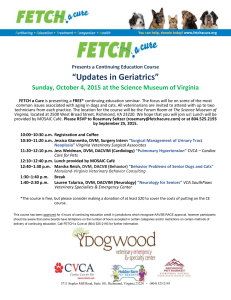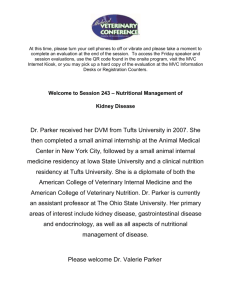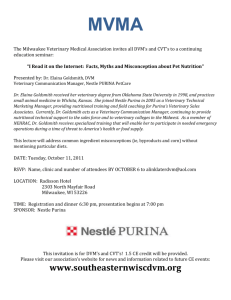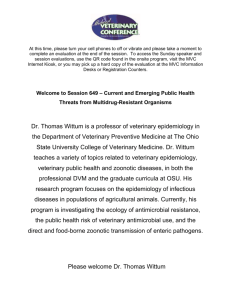here
advertisement
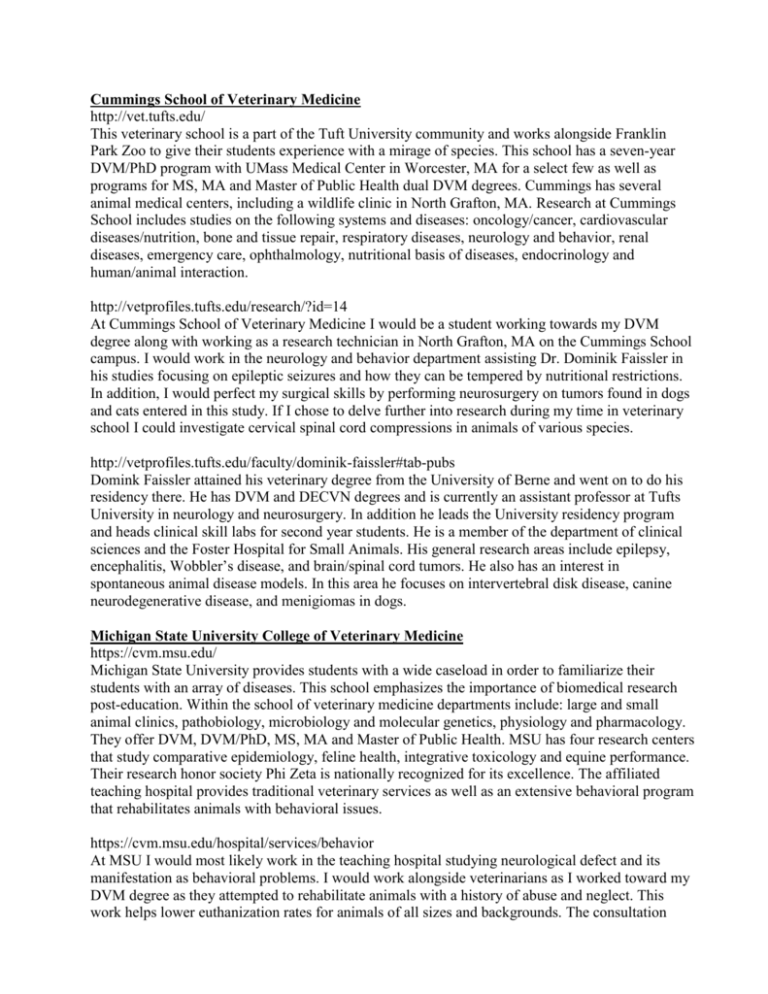
Cummings School of Veterinary Medicine http://vet.tufts.edu/ This veterinary school is a part of the Tuft University community and works alongside Franklin Park Zoo to give their students experience with a mirage of species. This school has a seven-year DVM/PhD program with UMass Medical Center in Worcester, MA for a select few as well as programs for MS, MA and Master of Public Health dual DVM degrees. Cummings has several animal medical centers, including a wildlife clinic in North Grafton, MA. Research at Cummings School includes studies on the following systems and diseases: oncology/cancer, cardiovascular diseases/nutrition, bone and tissue repair, respiratory diseases, neurology and behavior, renal diseases, emergency care, ophthalmology, nutritional basis of diseases, endocrinology and human/animal interaction. http://vetprofiles.tufts.edu/research/?id=14 At Cummings School of Veterinary Medicine I would be a student working towards my DVM degree along with working as a research technician in North Grafton, MA on the Cummings School campus. I would work in the neurology and behavior department assisting Dr. Dominik Faissler in his studies focusing on epileptic seizures and how they can be tempered by nutritional restrictions. In addition, I would perfect my surgical skills by performing neurosurgery on tumors found in dogs and cats entered in this study. If I chose to delve further into research during my time in veterinary school I could investigate cervical spinal cord compressions in animals of various species. http://vetprofiles.tufts.edu/faculty/dominik-faissler#tab-pubs Domink Faissler attained his veterinary degree from the University of Berne and went on to do his residency there. He has DVM and DECVN degrees and is currently an assistant professor at Tufts University in neurology and neurosurgery. In addition he leads the University residency program and heads clinical skill labs for second year students. He is a member of the department of clinical sciences and the Foster Hospital for Small Animals. His general research areas include epilepsy, encephalitis, Wobbler’s disease, and brain/spinal cord tumors. He also has an interest in spontaneous animal disease models. In this area he focuses on intervertebral disk disease, canine neurodegenerative disease, and menigiomas in dogs. Michigan State University College of Veterinary Medicine https://cvm.msu.edu/ Michigan State University provides students with a wide caseload in order to familiarize their students with an array of diseases. This school emphasizes the importance of biomedical research post-education. Within the school of veterinary medicine departments include: large and small animal clinics, pathobiology, microbiology and molecular genetics, physiology and pharmacology. They offer DVM, DVM/PhD, MS, MA and Master of Public Health. MSU has four research centers that study comparative epidemiology, feline health, integrative toxicology and equine performance. Their research honor society Phi Zeta is nationally recognized for its excellence. The affiliated teaching hospital provides traditional veterinary services as well as an extensive behavioral program that rehabilitates animals with behavioral issues. https://cvm.msu.edu/hospital/services/behavior At MSU I would most likely work in the teaching hospital studying neurological defect and its manifestation as behavioral problems. I would work alongside veterinarians as I worked toward my DVM degree as they attempted to rehabilitate animals with a history of abuse and neglect. This work helps lower euthanization rates for animals of all sizes and backgrounds. The consultation starts with a physical assessment, where animals are checked for any pressing medical conditions that would cause them to act aggressively out of stress or pain. I could use the experience gained working in the behavioral clinic of the MSU Animal Hospital to further my career as a wildlife behavioral specialist. Working with Marie Hopfensperger, DVM, I would have the ability to save the lives of hundreds of animals who would have no other option but to be put down if behavioral changes were not made immediately. https://cvm.msu.edu/hospital/services/behavior Marie Hopfensperger, DVM is a doctor of veterinary medicine who currently runs the Behavioral Service at Michigan State University. She attended MSU College of Veterinary Medicine where she received honors and proceeded on to a residency at North Carolina State University. Dr. Hopfensperger is currently in the midst of specialty training in behavior at Michigan State University. In the past she has worked in a small animal clinic in northern Michigan and has completed research primarily in the field of behavioral pharmacology, where she studied sedation methods to minimize animal anixety. Her expertise is such a commodity that there is a three to six month waitlist for her services. University of California – Davis DVM Program www.vetmed.ucdavis.edu/ The UC Davis Veterinary School teaches approximately 530 students and holds the following programs: DVM, Master of Preventative Veterinary Medicine (MPVM), DVM/PhD dual degree, MS, PhD, Master of Public Health and the largest residency program in the US. The teaching hospital has clinics for both large and small animals as well as laboratory services and diagnostic imaging services. There is a mentor/mentee program within the graduate school. The following core facilities report to the UC Davis Office of Research: analytical lab, molecular imaging core, center for mind/brain, center for genomic imaging, center for micromanufacturing, center for visual sciences, comparative pathology laboratory, genome center, microbe systems, paleomagnetism lab, and UC Davis mouse biology program. The Merial Veterinary Scholars Program allows first and second year DVM students to be exposed to biomedical research while obtaining their degree. http://cpl.ucdavis.edu/?f=micro If I attended University of California – Davis Veterinary School I would love to be a part of the Merial Scholars Program, which trains veterinary scientists in modern research techniques and practices while the students obtain their DVM degree. I would work in the comparative pathology research department and work as a diagnostic for laboratory animals. Specialzing in microbiology and parasitology, I would examine cultures of the digestive tract or possible parasitic extractions. Through their online database, I would identify any parasite or microbiological pathogens as well as identify any new species cultured. Cultures are obtained through necropsy procedures that would require training. http://www.vetmed.ucdavis.edu/ce/local_resources/pdfs/bio_Bain.pdf Dr. Melissa Bain is the Chief of Service of the Clinical Animal Behavior Services and an Associate Professor at the University of California – Davis Veterinary School. Dr. Bain obtained her DVM degree in 1994 from the University of Illinois. In 1998 she became part of the residency program at UC Davis and was board certified by 2001. She was president of the American College of Veterinary Behaviorists and the American Veterinary Society of Animal Behavior. While she teaches and manages clinical cases, she is heavily involved in research. Her research focuses on clinical domestic animal behavior problems and bonds between humans and animals as well as how different training methods influence that bond.
